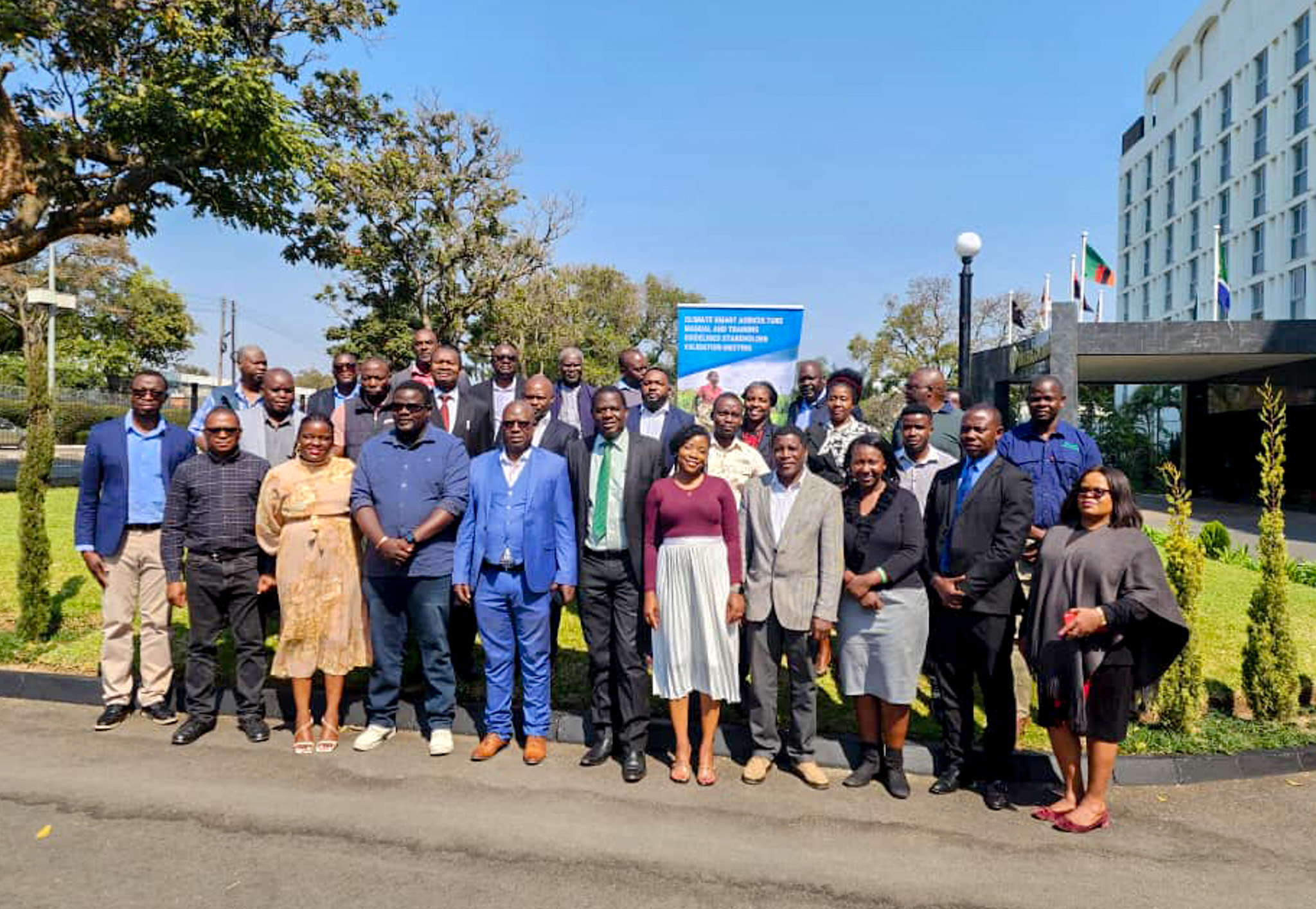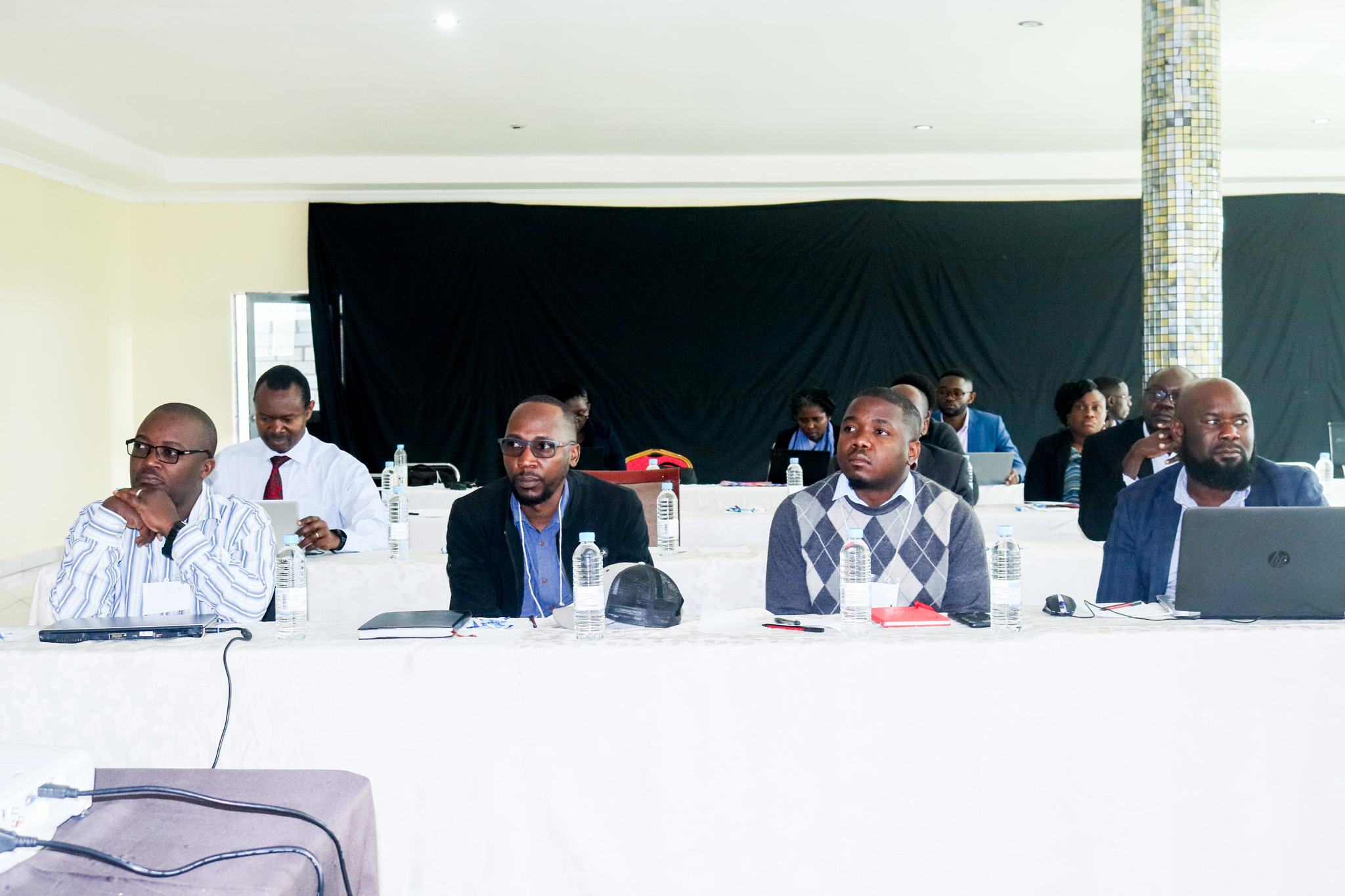Cultivating Adaptation in Zambia: Engaging Stakeholders in Digital Climate Advisory Services
The government of Zambia, with the support of GCA, engaged stakeholders during a validation meeting and training of trainers on climate-smart agriculture as part of the World Bank’s Zambia Growth Opportunity Performance for Results Program
Z
ambia’s smallholder farmers, who produce up to 80% of Zambia’s domestic food supply, are facing considerable difficulties due to climate change. More extreme floods and droughts are compounding land overuse and soil degradation, affecting the productivity of smallholder farmers.
To help Zambia achieve its potential as an agricultural powerhouse for Africa in the face of climate change, the Global Center on Adaptation (GCA) is mainstreaming digital climate advisory services into the World Bank’s US$300 million Zambia Growth Opportunity Performance for Results Program (ZAMGRO). Digital climate advisory services provide tools, platforms and activities that help individuals and organizations make climate-resilient decisions and adapt to climate variability and change. GCA is supporting ZAMGRO through the Africa Adaptation Acceleration Program (AAAP).

Sowing the Seeds of Collaboration
On 15th August 2023, stakeholders from the public and private sector conducted a validation meeting in Lusaka, Zambia as part of the project. During the validation meeting, stakeholders shared their insights on the Climate Smart Agriculture (CSA) Manual and Training Guidelines, which was developed by the Indaba Agricultural Policy Research Institute (IAPRI) with GCA’s support.
Ministry of Agriculture Principal Agriculture Officer Louis Chikopela said: “The CSA Manual and Training Guidelines have been developed with thorough consultation and engagement of key stakeholders. The documents are inclusive of all aspects of agriculture which include irrigation, mechanization, policy environment, agroforestry, conservation agriculture, and soil health. The CSA Manual is of international standard with clear definitions of terms used within climate-smart agriculture. This will enhance the harmonization of messages passed on to the extension officers and the smallholder farmers, and be cited among scholars and extension practitioners. This will in turn provide a blueprint to help mitigation and adaptation of climate change effects among farmers.”
The CSA Manual and Training Guidelines will contribute to sharing knowledge and skills with smallholder farmers about the effects of climate change and how to be resilient. The adoption of climate-smart agriculture practices will, in the long run, contribute to increased productivity and diversified income sources. Hence, households will become food and nutrition secure, Mr. Chikopela said.
Independent CSA local consultant Micheal Lwaile said: “The CSA Manual and Training Guidelines will have positive impacts on the agriculture community if well implemented at national, provincial, and district levels. This is because the documents contain key information on climate-smart agriculture, standardized CSA technologies, and practices. The manual contains research-based and practical information. For example, adaptation and mitigation knowledge on water dams and irrigation facilities will enable smallholder farmers to undertake crop production throughout the year and attain food security, even in advents of droughts or dry spells.”
Women’s Environs in Zambia National Coordinator, Susan Chilala observed that the CSA Manual and Training Guidelines help raise awareness on adaptation among smallholder farmers. It is expected that the adoption and implementation of the documents’ content will enhance crop productivity and production. “It should not be business as usual. With climatic change, people should adapt and change the manner of growing crops and move away from the traditional way of farming or livestock rearing and adopt climate-smart agriculture,” said Ms. Chilala.
Ministry of Agriculture Principal Economist and ZAMGRO focal point Chongo Banda noted in her remarks that ZAMGRO is a deliverable-based program with three components: 1) Enhanced policies and institutions, 2) improved services, and 3) improved rural infrastructures and assets. The program aims to transform the agriculture sector and benefit individuals who are directly linked to the agri-food sector value chain. The project is also meant to benefit women and young people.
Solidaridad Program Manager Friday Siwale observed the need for stakeholders involved in developing and implementing the updated CSA Manual and Training Guidelines to periodically review the documents so that they are updated with climate change trends and maintain relevance at international and local levels.
The CSA Manual and Training Guide for crop production in Zambia has 12 modules covering a range of topics, from climate change adaptation to biodiversity loss. YouTube videos are also included to further help trainers understand the content in the document while conducting CSA trainings for smallholder farmers.
This video on rainwater harvesting for climate change adaptation is included among the wealth of resources shared in the CSA Manual and Training Guide
Empowering Climate Smart Agriculture Trainers
To roll out the manual, two training of trainers of public sector personnel were held in September 2023. The workshops were aimed at building the capacity of and obtaining feedback from the Ministry of Agriculture’s provincial staff regarding the CSA Manual and Training Guidelines.

One of the trainers, Rodgers Kabiti, Chief Agricultural Research Officer in Soil and Water Management at Zambia Agriculture Research Institute (ZARI), said the trainees acquired more knowledge of what CSA really is and how it could be practiced. For instance, trainees learned the importance of using sustainable soil nutrient management for optimal soil and crop productivity, as well as of growing drought-resistant sorghum varieties for climate resilience.
The training also refocused minds to consider agricultural practices with a CSA approach. The workshop provided a forum where practical possible solutions for per region were identified and discussed, and a climate-resilient mindset was stimulated in the trainees.
Angela Mbao, a trainee and Technical Research Assistant from Eastern province, shared that in addition to improving her understanding of climate change, she learned ways of adopting conservation agriculture, such as the use of rip lines and basins to store moisture, and diversifying income sources through beekeeping and rearing chickens. Moreover, Ms. Mbao learned about planting early-maturity crop varieties and water harvesting as techniques for tackling climate change impacts.
Melody Chali, another trainee who is a Senior Research Assistant at Zambia Agriculture Research Institute (ZARI), commended the trainers for making the workshop interactive and practical. “I learned new facts that other countries receive less rain but produce more food, the case of Kenyan regions,” she said. Ms. Chali also noted that the CSA Manual would serve as her reference material moving forward, noting that it was easy to understand, and conformed to both local and international contexts.
Ministry of Agriculture Principal Economist Chongo Banda noted that the training of trainers aimed to strengthen extension service delivery through CSA training to an average of five people from the 10 provinces of the country, who are expected to extend the knowledge by training district extension officers who would then train camp extension officers, and eventually camp officers would further train the farmers who are the intended ultimate beneficiaries. However, Banda added, “There are 3.9 million small-scale farmers against the 2,620 agricultural camps. To help tackle this challenge, adoption and implementation of effective extension service delivery using digital platforms and meeting the farmers and lead farmers approach concept would be ideal in reaching more farmers.”